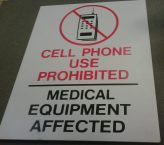[?]Subscribe To This Site
|
Hospital Rules and EtiquetteBecoming familiar with the hospital rules and etiquette well help eliminate some of your worries, if you are planning on visiting a family member or friend in the hospital and are worried about what to bring or what to expect. Before driving out on the open road, you learn the rules of the road. Before you attend a company dinner, you brush up on your etiquette. Learning codes of conduct ahead of time can make this a lot more enjoyable. The same is true when you are visiting someone at the hospital. Here is an outline of some basic hospital rules and etiquette:
Return to Going to the Hospital |






